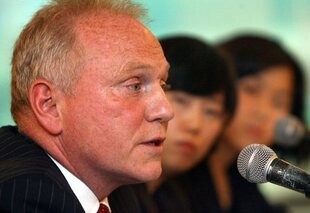hankyoreh
Links to other country sites 다른 나라 사이트 링크
S. Korea wants to rewrite its tax treaties

U.S. private equity fund Newbridge Capital gained 1.15 trillion won (US$1.25 billion) in profits by reselling Korea First Bank in 2005. However, the American fund did not pay a penny in tax in South Korea because Newbridge Capital made the transaction via its unit in the Malaysian tax haven of Labuan, which has signed a treaty banning double taxation with South Korea. Meanwhile, The Carlyle Group, another U.S. private fund, earned 700 billion won (US$761 billion) by reselling KorAm Bank and U.S. investment bank Goldman Sachs earned 1 trillion won (US$1.09 billion) by reselling Korean distiller Jinro, Ltd. Just as with Newbridge, neither of the two firms had to pay tax in South Korea.
In the case of Lone Star Funds, South Korea’s National Tax Service ordered the U.S. private fund to pay 140 billion won (US$152 billion) in taxes for reselling the Star Tower building. However, it is uncertain how the tax authorities will collect taxes on gains worth some 2 trillion won (US$2.17 billion) racked up by Lone Star for reselling shares of Korea Exchange Bank, Kukdong Engineering & Construction Co. and Star Lease Co.
Under a tax agreement between South Korea and Malaysia, Malaysia can only collect stock-transaction taxes from a company if the company is based in Malaysia. That means South Korea cannot collect taxes from Newbridge Capital and Carlyle. Goldman Sachs also avoided paying taxes using the tax treaty between South Korea and Malaysia.
South Korea’s tax officials can collect taxes from Lone Star’s sale of the Star Tower building by regarding the U.S. fund’s unit in Belgium as a paper company, however. This way, South Korea is able to use a provision in its tax treaty with the United States which allows South Korea to impose taxes on a company if the property involved in the transaction exceeds half of its transaction value. However, the provision will not be applied to Lone Star’s other sales, given the low percentage of real estate ownership.
South Korea has tax treaties with some 50 nations, however, in most such agreements, South Korea has been barred from collecting capital gains taxes. ‘‘From 1970, we needed more foreign capital amid the process of economic growth. So, such agreements couldn’t be helped,’’ said Yoon Young-seon, a senior official at the Ministry of Finance and Economy.
Soon, a delegation from the Ministry of Finance and Economy will leave for Belgium to engage in negotiations for a possible revision of the tax treaty between South Korea and the European country. While no timetable for the visit has yet been determined, the South Korean ministry is believed to be involved in discussions with The Netherlands and Ireland as well.
Owing to the heightened possibility that Lone Star may not pay any tax in South Korea, despite an expected windfall in profits resulting from the resale of its remaining shares in Korea Exchange Bank, the South Korean government is now belatedly taking steps to revise its tax treaties.
At stake is whether these nations will entertain proposals for changes to the tax treaties because the original texts currently favor them and not Korea. Yoon Yeong-seon, the senior ministry official who heads the South Korean delegation, said, ‘‘It will be a difficult negotiation because the outcome will have to meet expectations on both sides.’’
In its upcoming negotiations with Belgium, South Korea aims to include a provision that will allow the country to collect taxes, from stock-transaction gains earned by a company with more than 25 percent foreign investment, in the place where the transaction occurred.
‘‘Though we can’t reveal details, our basic position is that we want to write our preferences into the revisions,’’ Yoon said.
Please direct questions or comments to [englishhani@hani.co.kr]
Editorial・opinion
![[Column] Park Geun-hye déjà vu in Yoon Suk-yeol [Column] Park Geun-hye déjà vu in Yoon Suk-yeol](https://flexible.img.hani.co.kr/flexible/normal/500/300/imgdb/original/2024/0424/651713945113788.jpg) [Column] Park Geun-hye déjà vu in Yoon Suk-yeol
[Column] Park Geun-hye déjà vu in Yoon Suk-yeol![[Editorial] New weight of N. Korea’s nuclear threats makes dialogue all the more urgent [Editorial] New weight of N. Korea’s nuclear threats makes dialogue all the more urgent](https://flexible.img.hani.co.kr/flexible/normal/500/300/imgdb/original/2024/0424/7317139454662664.jpg) [Editorial] New weight of N. Korea’s nuclear threats makes dialogue all the more urgent
[Editorial] New weight of N. Korea’s nuclear threats makes dialogue all the more urgent- [Guest essay] The real reason Korea’s new right wants to dub Rhee a founding father
- [Column] ‘Choson’: Is it time we start referring to N. Korea in its own terms?
- [Editorial] Japan’s rewriting of history with Korea has gone too far
- [Column] The president’s questionable capacity for dialogue
- [Column] Are chaebol firms just pizza pies for families to divvy up as they please?
- [Column] Has Korea, too, crossed the Rubicon on China?
- [Correspondent’s column] In Japan’s alliance with US, echoes of its past alliances with UK
- [Editorial] Does Yoon think the Korean public is wrong?
Most viewed articles
- 1[Guest essay] The real reason Korea’s new right wants to dub Rhee a founding father
- 2Why Korea shouldn’t welcome Japan’s newly beefed up defense cooperation with US
- 3[Column] ‘Choson’: Is it time we start referring to N. Korea in its own terms?
- 4New AI-based translation tools make their way into everyday life in Korea
- 5[Column] Park Geun-hye déjà vu in Yoon Suk-yeol
- 6Senior doctors cut hours, prepare to resign as government refuses to scrap medical reform plan
- 7Opposition calls Yoon’s chief of staff appointment a ‘slap in the face’
- 8Will NewJeans end up collateral damage in internal feud at K-pop juggernaut Hybe?
- 9Terry Anderson, AP reporter who informed world of massacre in Gwangju, dies at 76
- 10Thursday to mark start of resignations by senior doctors amid standoff with government